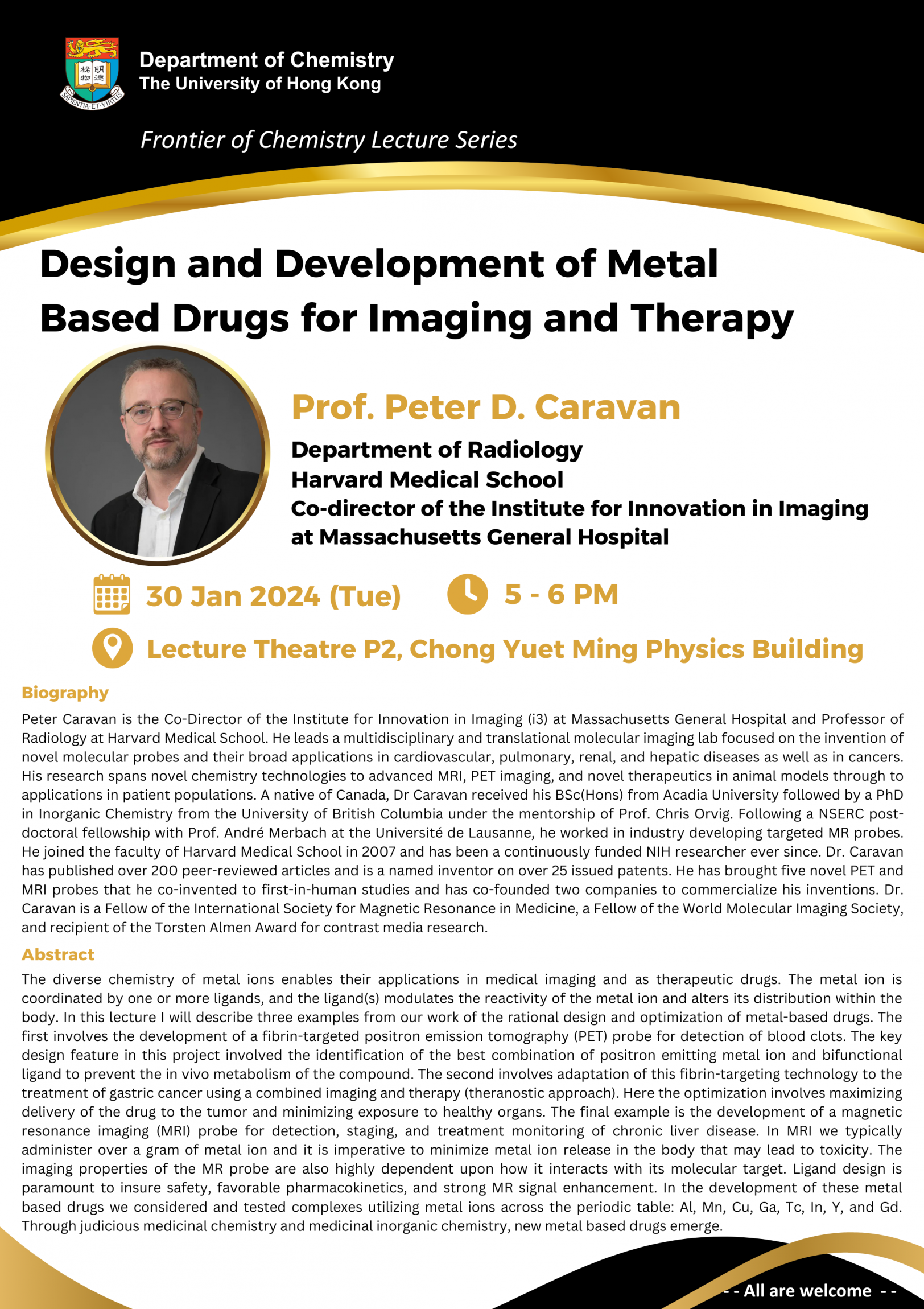| Date | 30 Jan 2024 |
| Time | 5:00 pm - 6:00 pm (HKT) |
| Venue | Lecture theatre P2, Chong Yuet Ming Physics Building |
| Speaker | Prof. Peter D. Caravan |
| Institution | Department of Radiology, Harvard Medical School, Co-director of the Institute for Innovation in Imaging at Massachusetts General Hospital |
 Title:
Title:
Design and Development of Metal Based Drugs for Imaging and Therapy
Schedule:
Date: 30th January, 2024 (Thursday)
Time: 5 - 6 pm (HKT)
Venue: Lecture Theatre P2, Chong Yuet Ming Physics Building
Speaker:
Prof. Peter D. Caravan
Department of Radiology
Harvard Medical School
Co-director of the Institute for Innovation in Imaging at Massachusetts General Hospital
Biography:
Peter Caravan is the Co-Director of the Institute for Innovation in Imaging (i3) at Massachusetts General Hospital and Professor of Radiology at Harvard Medical School. He leads a multidisciplinary and translational molecular imaging lab focused on the invention of novel molecular probes and their broad applications in cardiovascular, pulmonary, renal, and hepatic diseases as well as in cancers. His research spans novel chemistry technologies to advanced MRI, PET imaging, and novel therapeutics in animal models through to applications in patient populations. A native of Canada, Dr Caravan received his BSc(Hons) from Acadia University followed by a PhD in Inorganic Chemistry from the University of British Columbia under the mentorship of Prof. Chris Orvig. Following a NSERC post-doctoral fellowship with Prof. André Merbach at the Université de Lausanne, he worked in industry developing targeted MR probes. He joined the faculty of Harvard Medical School in 2007 and has been a continuously funded NIH researcher ever since. Dr. Caravan has published over 200 peer-reviewed articles and is a named inventor on over 25 issued patents. He has brought five novel PET and MRI probes that he co-invented to first-in-human studies and has co-founded two companies to commercialize his inventions. Dr. Caravan is a Fellow of the International Society for Magnetic Resonance in Medicine, a Fellow of the World Molecular Imaging Society, and recipient of the Torsten Almen Award for contrast media research.
Abstract:
The diverse chemistry of metal ions enables their applications in medical imaging and as therapeutic drugs. The metal ion is coordinated by one or more ligands, and the ligand(s) modulates the reactivity of the metal ion and alters its distribution within the body. In this lecture I will describe three examples from our work of the rational design and optimization of metal-based drugs. The first involves the development of a fibrin-targeted positron emission tomography (PET) probe for detection of blood clots. The key design feature in this project involved the identification of the best combination of positron emitting metal ion and bifunctional ligand to prevent the in vivo metabolism of the compound. The second involves adaptation of this fibrin-targeting technology to the treatment of gastric cancer using a combined imaging and therapy (theranostic approach). Here the optimization involves maximizing delivery of the drug to the tumor and minimizing exposure to healthy organs. The final example is the development of a magnetic resonance imaging (MRI) probe for detection, staging, and treatment monitoring of chronic liver disease. In MRI we typically administer over a gram of metal ion and it is imperative to minimize metal ion release in the body that may lead to toxicity. The imaging properties of the MR probe are also highly dependent upon how it interacts with its molecular target. Ligand design is paramount to insure safety, favorable pharmacokinetics, and strong MR signal enhancement. In the development of these metal based drugs we considered and tested complexes utilizing metal ions across the periodic table: Al, Mn, Cu, Ga, Tc, In, Y, and Gd. Through judicious medicinal chemistry and medicinal inorganic chemistry, new metal based drugs emerge.
- ALL ARE WELCOME -
